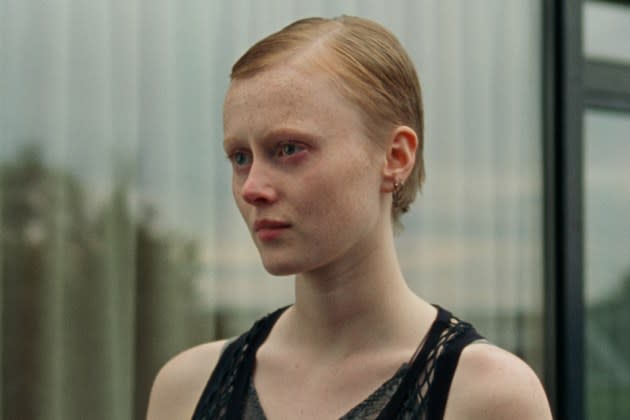‘When the Light Breaks’ Review: Minor-Key Icelandic Drama Paints a Stirring Portrait of Grief
- Oops!Something went wrong.Please try again later.

A pair of young adults sit on a rocky coast staring at the sun as it hovers on the horizon, casting an ochre glow over the landscape. They trade dreams, jokes and promises while smoking a joint. She teases him about being horny. He vows to break up with his girlfriend, so they no longer have to hide their relationship. Later, in bed, nestling into the grooves of each other’s bodies, they will excitedly murmur their visions of tomorrow.
None of their tomorrows comes true because the boy, Diddi (Baldur Einarsson), dies. On his way out of town, an explosion engulfs a tunnel in Reykjavik in flames, indiscriminately incinerating vehicles and bodies like his own. When the girl, Una (Elin Hall), hears the news, she is enveloped by a gutting despair.
More from The Hollywood Reporter
Jeff Zucker's RedBird IMI Closes $1.45B All3Media Acquisition From WBD, Liberty Global
Imax Unveils 2025 Film Slate, Including 'Superman: Legacy' and 'The Fantastic Four'
Without ever working above a whisper, Runar Runarsson’s When the Light Breaks (Ljósbrot) finds distinctive and unexpectedly stirring ways to portray grief and untimely death. It follows a group of young adults — chief among them Una — in the Icelandic city as they cope with the unexpected loss of Diddi, chronicling how they navigate the rough emotional terrain. The film, which opened Un Certain Regard at Cannes, marks the Icelandic director’s second time on the Croisette. Runarsson’s first feature, Volcano, debuted at Cannes’ Directors’ Fortnight in 2011.
An appreciation for grief’s minor moments coupled with a striking visual language elevate this slender drama. Runarsson is attuned to the details of loss and recognizes the narrative power of these instances. He lingers where others might cut, hordes what, at first, seems disposable and homes in on the familiar long enough to render it uncanny. Working with cinematographer Sophia Olsson, the director arranges his scenes like a painter does a still life. While there are plenty of intimate shots, some of the most poignant moments in When the Light Breaks are shot from a distance, when the loneliness of each character is acutely felt despite their bustling surroundings. These compositions have surprising emotional impact and a clarifying depth.
News of the explosion sends shockwaves through Reykjavik, a devastating tragedy whose force is communicated through a quiet sequence near the start of the film and later with a shot of the country’s flags flown at half-mast. It also brings together an unlikely crew composed of Diddi’s bandmate and roommate Gunni (Mikael Kaaber); his childhood friends Siggi (Gunnar Hrafn Kristjansson) and Bassi (Agust Wigum); Diddi’s girlfriend Klara (Katla Njalsdottir); and Una, his bandmate and lover. Bonded by their friend’s death, the group floats through the city, buoyed by their sadness and shock. They loiter around the trauma care center where they received the news, stop at Diddi’s old bar and take shots of his favorite vodka and, later, convene at a house to look through old photos, barbecue and dance until the tears can no longer be contained.
The most affecting parts of When the Light Breaks unfold between Una and Klara, two young women whose respective mourning processes, at first, seem to wrestle for the group’s attention. Klara doesn’t know that Diddi was rushing out of the city to break up with her, and Una promises Gunni that she won’t say anything. The vow curtails her ability to grieve, and Hall, in an understated performance, translates that to haunting effect. When Una stares at the others as they hug Klara and soothe her with reminders of how much Diddi loved her, one senses the flashes of jealousy. The two also share poignant moments, like when they return to the spot where audiences first met Diddi and Una to watch the sun, still peeking above the horizon.
Kaaber, as Diddi’s roommate Gunni, also gives a strong performance, deftly conveying the dual requirements of his character: navigating his own grief while also bridging the gap between Una and Diddi’s friends from home. The conversations between Gunni and Una have a particularly painful edge as the two young adults, inexperienced with the weight of loss, try to deal with thorny moral questions too.
The universal themes and skilled direction suggest that When the Light Breaks could have strong arthouse prospects should it move beyond the festival circuit. It possesses the same spareness and surprising depth as Christian Petzold’s Afire, which also dealt, in part, with unexpected grief. Alongside its study of a singular kind of heartbreak, Runarsson’s film offers images that anyone who can relate to losing a loved one at a young age will find impossible to shake.
Best of The Hollywood Reporter
